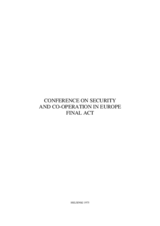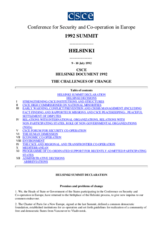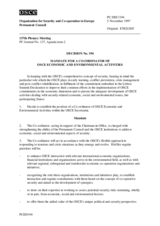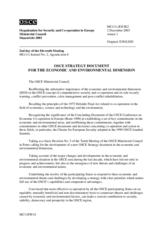-
Our work
-
Fields of work
- Arms control
- Border management
- Combating trafficking in human beings
- Conflict prevention and resolution
- Countering terrorism
- Cyber/ICT Security
- Democratization
- Economic activities
- Education
- Elections
- Environmental activities
- Gender equality
- Good governance
- Human rights
- Media freedom and development
- Migration
- National minority issues
- Policing
- Reform and co-operation in the security sector
- Roma and Sinti
- Rule of law
- Tolerance and non-discrimination
- Youth
- Field operations
- Projects
-
Meetings and conferences
- Summit meetings
- Review Conferences
- Ministerial Council meetings
- Plenary meetings of the Permanent Council
- Plenary Meetings of the Forum for Security Co-operation
- Security Review Conferences
- Annual Implementation Assessment Meetings
- Economic and Environmental Forum
- Economic and Environmental Dimension Implementation Meetings
- Human rights meetings
- Media conferences
- Cyber/ICT security conferences
- Conference of the Alliance against Trafficking in Persons
- Gender equality conferences
- Annual OSCE Mediterranean conferences
- Annual OSCE Asian conferences
- Partnerships
-
Fields of work
-
Countries
- All
-
Participating States
- Albania
- Andorra
- Armenia
- Austria
- Azerbaijan
- Belgium
- Belarus
- Bosnia and Herzegovina
- Bulgaria
- Canada
- Croatia
- Cyprus
- Czechia
- Denmark
- Estonia
- Finland
- France
- Georgia
- Germany
- Greece
- Holy See
- Hungary
- Iceland
- Ireland
- Italy
- Kazakhstan
- Kyrgyzstan
- Latvia
- Liechtenstein
- Lithuania
- Luxembourg
- Malta
- Moldova
- Monaco
- Mongolia
- Montenegro
- The Netherlands
- North Macedonia
- Norway
- Poland
- Portugal
- Romania
- Russian Federation
- San Marino
- Serbia
- Slovakia
- Slovenia
- Spain
- Sweden
- Switzerland – OSCE Chairpersonship 2026
- Tajikistan
- Türkiye
- Turkmenistan
- Ukraine
- United Kingdom
- United States of America
- Uzbekistan
- Asian Partners for Co-operation
- Mediterranean Partners for Co-operation
-
Structures and institutions
- Chairpersonship
-
Secretariat
- Secretary General
- Office of the Secretary General
- Conflict Prevention Centre
- Transnational Threats Department
- Office of the Special Representative and Co-ordinator for Combating Trafficking in Human Beings
- Office of the Co-ordinator of OSCE Economic and Environmental Activities
- Gender Issues Programme
- Opportunities for Youth
- Department of Human Resources
- Department of Management and Finance
- Office of Internal Oversight
- Documentation Centre in Prague
- Institutions
-
Field operations
- Presence in Albania
- Centre in Ashgabat
- Programme Office in Astana
- Programme Office in Bishkek
- Mission to Bosnia and Herzegovina
- Programme Office in Dushanbe
- Mission in Kosovo
- Mission to Moldova
- Mission to Montenegro
- Mission to Serbia
- Mission to Skopje
- Project Co-ordinator in Uzbekistan
- Closed field activities
- Parliamentary Assembly
- Court of Conciliation and Arbitration
- Organizational structure
- About us
Our mandate on environmental issues
Helsinki Final Act
1 August 1975
The OSCE’s mandate on environmental issues goes back to the early days of the CSCECSCE
Conference on Security and Co-operation in Europe negotiations in the early 1970s and the Helsinki Final Act 1975, which included both economic and environmental questions in what was then commonly referred to as ‘basket II’. Among other issues, the participating States agreed “to study, with a view to their solution, those environmental problems which, by their nature, are of a multilateral, bilateral, regional or sub-regional dimension” and “to increase the effectiveness of national and international measures for the protection of the environment”.
The Challenges of Change
10 July 1992
A central institution in the OSCE’s environmental dimension was created at the Helsinki Follow-up Meeting, which took place between 24 March and 8 July 1992. The event, where the participating States made important steps to institutionalize the CSCE—eventually paving the way for it to be renamed into the OSCE—established, among many other bodies, the Economic Forum. The Forum quickly became an annual event and was renamed in 2007 the Economic and Environmental Forum, reflecting the growing importance of environmental security issues, such as land degradation and the management of water resources.
Permanent Council Decision No. 194
5 November 1997
Both in Rome in 1993 and in Budapest the following year, the OSCE participating States made statements aimed at strengthening the second dimension. Another important milestone was reached when in 1996, at the Lisbon Summit meeting, the Heads of State or Government tasked the Permanent Council with elaborating the mandate for a Co-ordinator of OSCE Economic and Environmental Activities within the Secretariat. The Permanent Council agreed to a mandate on 5 November 1997, establishing the position of Co-ordinator of OSCE Economic and Environmental Activities within the OSCE Secretariat.
OSCE Strategy Document
OSCE Strategy Document for the Economic and Environmental Dimension
2 December 2003
In 2003, at the Ministerial Council in Maastricht, the participating States adopted the OSCE Strategy Document for the Economic and Environmental Dimension and committed themselves to co-operating on economic, good governance and sustainable development issues.
Reference Manual 2019
OSCE Economic and Environmental Dimension Commitments: Reference Manual 2019
24 October 2019
Over the years, the CSCE/OSCE has widened its portfolio of environmental activities, including such issues as energy security and improving the environmental footprint of energy-related activities, water management and waterways co-operation, as well as disaster risk reduction. A full compendium of commitments made by the participating States in the environmental realm is contained in a reference manual on the OSCE’s second dimension.




